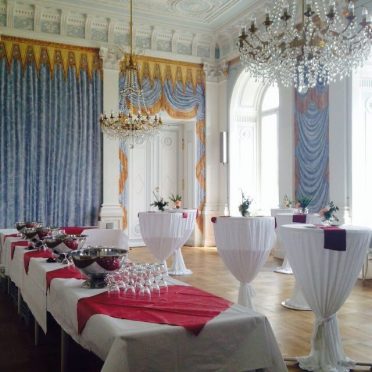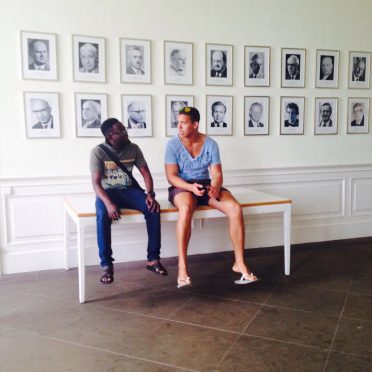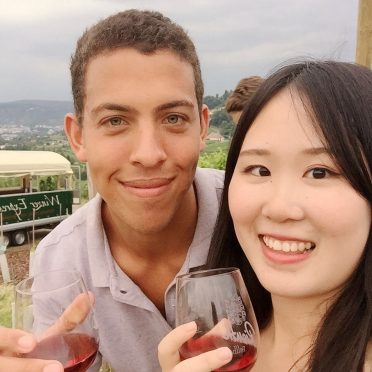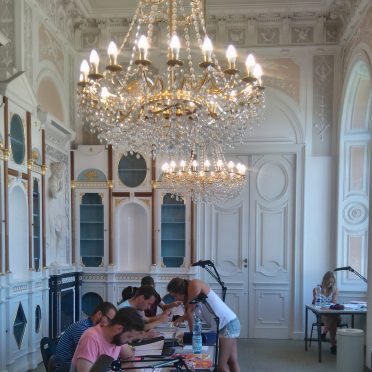Pre-departure:
Dreams do come true and we have the power to make them real. We just have to believe in ourselves and anything is possible. If your dream is to travel and study abroad, then you have to have a passport. Go to the Department of Home Affairs and apply for one. It’s a small step, but it helps kick start the process of turning a dream into reality.
The application process for an international summer school is rather straight forward – all instructions are available on SU International’s website. A key component is selecting a summer school that you are interested in. Research, research and research the courses and programmes you may be interested in.
One should try and select a summer school that is aligned with the study programme back home. It will help in allowing you to participate in class discussions with a well-researched opinion. If it’s too similar it may become repetitive and that’s no fun either. I went on a summer school to learn, but had to remember that I’m representing South Africa and the University of Stellenbosch too. A German summer school with the themes Innovation, Entrepreneurship and Finance excited me. I study Actuarial Science at Stellenbosch so the topics were new, but not unfamiliar to me.
German efficiency is a real thing – especially with the visa application process. There’s a checklist available on the consulate’s website of everything you need from making an appointment to the documents required to get the visa approved.
As students we sometimes think that some documents are more important than others and that we can maybe hand in “half now and half later”. This does not apply to a visa.
The German consulate wants everything they ask you for – this should be similar for other embassies as well. Make sure that you are well prepared for the interview and that you arrive there with nothing missing. A friend of mine’s visa process took longer than anticipated as a document was forgotten at home. It resulted in a new appointment being made – including another appointment fee. Do not make this mistake. Double check all documents before heading off to apply for a visa.
Countries overseas do not use South African Rand. Familiarise yourself with the currencies you are using at your final destination as well as the currencies used at connecting airports – not everyone uses direct flights. I flew through Dubai which accepted US dollars as a form of payment, as well as their domestic currency at the airport.
A big decision is which form of payment to use overseas – cash, card and a combination of the two. I used a multi-currency cash card so that I did not have to carry large amounts of cash on me. It allowed me to make cash withdrawals at ATMs and to pay for goods at till points. I would recommend speaking to the bank you are currently using to give recommendations on what to use overseas. Also speak to their competitors – shop around.
Make sure you get enough sleep the night before your flight and pack in a small first aid kit into your luggage. Double check what items can and cannot be taken onto the flight as being stopped by airport security over a bottle of shampoo is an avoidable delay.
Experience at the Summer School:

I attended the summer school of Innovation, Entrepreneurship and Finance at the University of Hohenheim which is in the city of Stuttgart in Germany. Stuttgart and its surroundings are widely known to belong to Europe’s most economically thriving regions. This resulted in many corporate visits during the 3.5 week summer school.
The three themes of the summer school were well integrated into the programme – innovation, entrepreneurship and finance. The economic success of a country critically depends on not inventions, but on rather the innovations produced. For it to become a sustainable business, a developed entrepreneurial and management plan is required. Now for an innovation to be launched and not merely remain an idea, financing is required to develop it and the entrepreneurial activities.

To travel halfway around the world to sit in a classroom and learn about innovation, entrepreneurship and finance does not sound exciting for the average layman – especially when they are not particularly interested in business. However, this programme had students that come from a range of undergraduate majors – from English to Engineering. It captured the attention of the students attending the summer school very well due to the relevance of the company visits.
At Mercedes-Benz we learnt about the maintenance of a motor while at their 3D vehicle repair centre. Here we learnt about the importance of planning, pricing and managing costs in a business. We were shown how vehicles today are designed so that routine maintenance can take place quickly to reduce contact time between the mechanic and vehicle.

At the Porsche museum and factory plant we learnt about the importance of passion when starting a business. Porsche did not see the car he wanted to drive on the road – so he designed it. This was an incredibly powerful message. It showed us how looking for and finding gaps in the market to create businesses, should start with the gaps we experience in our daily living. To then provide a product or service customers would pay for then becomes easier as it would immediately satisfy one person’s need – your own.
Now not all companies become world renowned brands. Company visits to small companies really taught us about the importance of hard work and perseverance. Many companies start up and close within the first 3 years. These should be describes as such – closures and not failures. What makes an entrepreneur successful is their ability to learn from their prior business activities so that they become better at a future stage.

What the University of Hohenheim did well was show the relevance of the course material in practice. I think this is something Stellenbosch University can improve on. We learn a lot of theory in the classroom, but there are times when it is difficult to see the practicality of it in the real world. However, I found that Stellenbosch University’s administration and organisational systems are of the highest quality. At Stellenbosch University, the stages of arrival to departure of a student are planned more thoroughly and with a little bit of work, University of Hohenheim can improve their own systems currently in place.
Return to Stellenbosch:
Getting back home was difficult, no jokes. I flew home from Munich but on the eve of my return home there were a shooting at a restaurant in the city – resulting in a lockdown. A city buzzing with activity suddenly turned into a ghost town within the span of a few hours. Buses, trains and taxis were ordered off the streets. There was a time I had to walk through military in combat gear carrying AK 47s to catch a bite to eat at a local take-aways. We stay in a time where terrorism is a real, but in these situations we need to remain calm and follow instructions from police.
The trip changed my perspective on the way we should see ourselves as Africans on the global setting. We are equals. We are excellent at what we do. In classroom discussions we are able to interact as thought leaders and do not need to feel inferior to any other nation. We are sometimes ahead of our American and European counter parts in technical skills relating to accounting, processing data and interpreting financial math.
What we need to do is improve our softer skills. We need to improve the way we treat people of colour and women in the business environment. Many professors in at the University of Hohenheim believe that South Africa has immense potential to become a world leader – we have the ability, human capital and resources. The problem we have is the way our resources are allocated. Serious intervention is still required to provide a quality education to the masses, as an educated population is one that can provide innovations that can stimulate the economy.
The summer school has made me aware of the educational resources available locally and abroad. Too many of us select against ourselves and do not apply for these opportunities. Successful entrepreneurs take advantage of the resources around them – they send the emails and make the phone calls. They network effectively.
We need to develop our networks on social media for business in South Africa. People overseas interact with businessmen and potential mentors on Facebook and LinkedIn. They promote their ideas on “fund me” campaigns. They take the first step in making their dreams a reality. A key step in successful entrepreneurial activity is to use the network to generate feedback on how to make your product or service better – and not to generate likes and followers.
The summer school has really encouraged me to go to Europe again. It has encouraged me to learn more about European economic development and how it can be applied in an African context. Many of the problems faced in South Africa have been faced in Europe before and we cannot be making the same mistakes that they have. We need to make sure that we learn from history and find solutions to our issues and struggles. We are a beautiful country. We need to tap into our potential.

